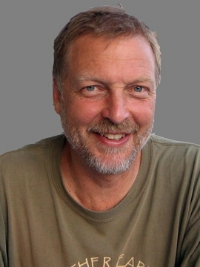Robert Sitler
Professor of World Languages and Cultures, Director of Latin American and Latino Studies Program
Robert Sitler's ongoing academic passion for all things indigenous American has been complemented by numerous immersion experiences with his family among people from over a dozen language groups in Guatemala, Mexico, Belize Peru, Argentina, Ecuador and the United States. He is currently studying the history of Native peoples near the Stetson campus.
- PhD, Hispanic literatures, University of Texas

Biography
Robert Sitler fell in love with the Native world in the mid-1970s while visiting Ch'ol villagers in the rain forest of Chiapas, Mexico. He completed a doctorate in Hispanic literatures at the University of Texas-Austin in 1994. His dissertation on Maya-related Criollo fiction was done with the help of the late Linda Schele who oversaw the project's Mayan dimensions. Sitler's ongoing academic passion for all things Maya has been complemented by numerous immersion experiences with his family among Maya from a dozen language groups in Guatemala, Mexico and Belize. His primary interests have been the Mam-speaking community of Todos Santos Cuchumatán, Guatemala and the significance of year 2012 in the Mayan Long Count calendar. More recently, he has shifted focus to the peoples of the Andes, especially in the Kechwa-speaking areas around Cusco and the Kichwa-speaking communities of southern Ecuador. He currently serves as director of Stetson's Latin American and Latino Studies Program and helps coordinate an LALS summer study abroad program in Cuenca, Ecuador. He also supervises the Florida Aquatic Gems project which highlights extraordinary water features near the DeLand campus.
More About Robert Sitler
Areas of Expertise
- History of local water features
- Mayan & other indigenous cultures of the Americas
- Local Hispanic communities
Course Sampling
- Language in Cultural Contexts
- Reading Culture
- Understanding Spanish America
- Mayan Culture
- Indigenous Cultures in Latin American Literature
- Latin American Culture in Films
- Living Our Values
- Mentored Field Experience
- Indigenous cultures of Latin America
- Latino cultures in the U.S.
- Values-centered education
- Foreign language teaching methodology
- Campus sustainability
- "Immersed in the Millennial History of DeLeon Springs." Journal of Florida Studies 1.6 (2017)
- "Remembrance and Rebirth in Blue Spring (Volusia County)," Journal of Florida Studies 1.3 (Spring 2014).
- "The 2012 Phenomenon Comes of Age," Nova Religio 16.1 (August 2012): 61-87.
- "Astronomy in the Mayan Long Count." ABC-Clio World History Ancient and Medieval Eras (Database) (2011). Thanasiu, Page, and S. M. Walter.
- "2012: Antik Maya," Aktuel Arkeoloji Dergisi. Istanbul: Temmuz-Agustos 2011.
- "The 2012 Phenomenon: New Uses for an Ancient Mayan Calendar," 2012: Decoding the Countercultural Apocalypse. London: Equinox, 2010
- "The Living Maya: Ancient Wisdom in the Era of 2012." Berkeley, CA: North Atlantic Books, 2010.
- Translation of Gaspar Gonzalez. 13 Baktun: Maya Visions of 2012 and Beyond. Berkeley, CA: North Atlantic Books, 2010.
- "'2012' a teachable moment for Maya culture experts." Orlando Sentinel (Nov. 2009)
- "Quiche on 2012 Movie Menu Tastes Old." Daytona Beach News-Journal (Nov. 20, 2009)
- "2012 and the Maya World." The Mystery of 2012: Predictions, Prophecies & Possibilities. Boulder, CO: Sounds True, 2007. 89-107.
- "The 2012 Phenomenon: New Age Appropriation of an Ancient Mayan Calendar." Nova Religio 9.3 (Feb., 2006).